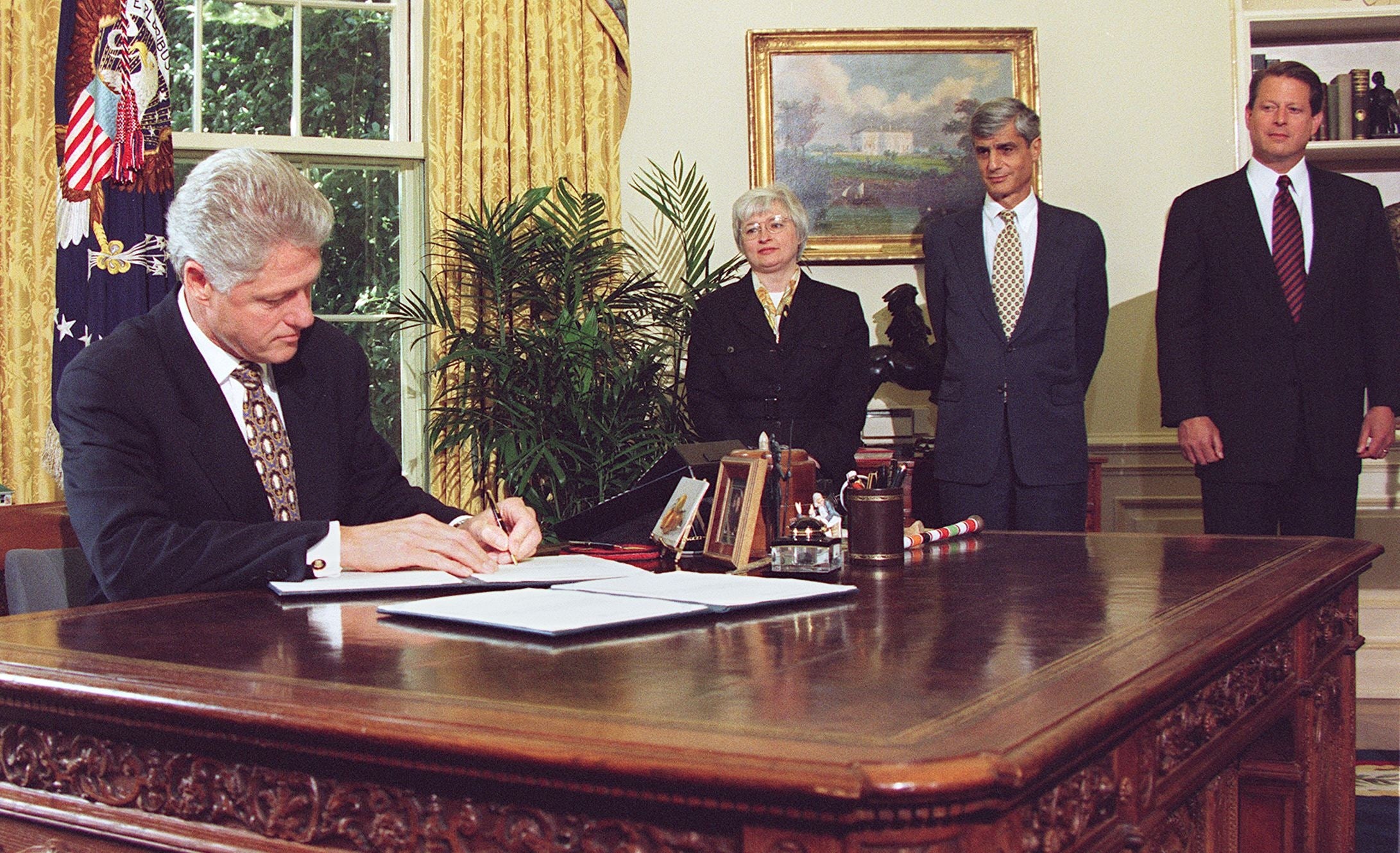Budget Battles Of The 1990s: Clinton's Veto Strategy And Its Consequences

Table of Contents
The 1990s witnessed intense budget battles between President Bill Clinton and a Republican-controlled Congress. Clinton's strategic use of the veto power significantly shaped the decade's fiscal landscape, leaving a lasting impact on US political discourse and economic policy. This article delves into the key budget conflicts, analyzing Clinton's veto strategy, its political implications, and its enduring consequences on the American economy and political discourse. We will examine specific bills, the political maneuvering, and the ultimate impact on the national debt and social programs.
The Political Landscape of the 1990s Budget Debates
The 1990s presented a unique political landscape: a Democratic president facing a Republican-controlled Congress. This divided government fueled intense partisan conflict, especially concerning the federal budget. Key players like Newt Gingrich, Speaker of the House, championed a Republican agenda focused on smaller government and fiscal conservatism. This ideological clash formed the backdrop for the decade's budget battles.
- Rise of the Republican "Contract with America": The 1994 midterm elections saw Republicans win control of both houses of Congress, propelled by the "Contract with America," a platform promising tax cuts, reduced government spending, and a balanced budget.
- Shift in Political Priorities: The Republican agenda prioritized a smaller government footprint, advocating for significant cuts in social programs and a balanced budget amendment. This directly contradicted the Democratic platform, leading to major disagreements on budgetary allocations.
- Increased Partisan Polarization: The 1990s witnessed a significant increase in partisan polarization, making bipartisan compromise on budget issues increasingly difficult. This political climate significantly impacted Clinton's ability to negotiate budget deals.
Clinton's Veto Strategy: A Detailed Look
President Clinton approached budget negotiations strategically, using the veto power as both a defensive and offensive tool. His decisions on whether to veto a bill were largely based on two key criteria: protecting key social programs and maintaining economic growth. He skillfully used the threat of a veto as a negotiating tactic, forcing Republicans to compromise.
- Focus on Protecting Key Social Programs: Clinton prioritized protecting Medicare, Medicaid, and other social programs from significant cuts proposed by the Republicans.
- Emphasis on Maintaining Economic Growth: Clinton aimed to avoid policies that could negatively impact economic growth. He vetoed bills he believed would harm the economy, even if they incorporated some aspects he supported.
- Strategic Use of Veto Threats: Clinton frequently threatened vetoes, using them as leverage during negotiations. This approach often led to compromises that better reflected his priorities.
- Examples of Specific Vetoes: Clinton vetoed several significant budget bills, including the Republican-backed "Contract with America" proposals. While specific bill numbers are extensive and require detailed research, his veto messages consistently cited concerns about harming social programs or jeopardizing economic stability.
Key Budget Bills and Vetoes
Several significant budget bills passed Congress during the 1990s, only to be met with Clinton's veto. These vetoes were pivotal in shaping the fiscal landscape of the decade.
- Specific Examples of Bills Vetoed: Analyzing individual bills requires extensive research into Congressional records, but examples might include bills significantly reducing funding for education, environmental protection, or social welfare programs.
- Analysis of the Budgetary Impact: Each vetoed bill represented a significant amount of funding, and the vetoes prevented considerable cuts to various government programs.
- Political Fallout and Public Reaction: Clinton’s vetoes sparked intense political debates, with Republicans criticizing him for excessive spending and Democrats praising his defense of social programs. Public opinion on the vetoes varied depending on individual political stances and priorities.
Economic and Social Consequences of Clinton's Vetoes
Clinton's vetoes had significant economic and social consequences, impacting both the national debt and various social programs.
- Analysis of Changes in the National Debt Trajectory: While the national debt continued to grow during the 1990s, Clinton's vetoes likely prevented even more rapid increases by preventing significant cuts to taxes and increases in spending.
- Impact on Specific Social Programs: Clinton's vetoes helped protect various social programs from substantial cuts. This safeguarding likely prevented more severe negative consequences for vulnerable populations.
- Short-Term and Long-Term Effects on Economic Growth: The overall impact of the vetoes on economic growth is a subject of ongoing debate among economists. Some argue that the vetoes helped maintain economic stability, while others suggest they hampered economic progress.
The Legacy of the 1990s Budget Battles
The budget battles of the 1990s left a lasting impact on US political discourse and policymaking.
- Increased Partisan Gridlock in Budget Negotiations: The intense partisan battles of the era set a precedent for future budget negotiations, often characterized by gridlock and a lack of bipartisan cooperation.
- Influence on Subsequent Presidents' Approaches to Budget Issues: Subsequent presidents learned from the 1990s budget battles, adapting their strategies to navigate the challenges of divided government and partisan polarization.
- Shift in Public Opinion on Government Spending and Taxation: The debates surrounding Clinton's vetoes significantly influenced public opinion on government spending, taxation, and the role of government in social welfare.
Conclusion:
The budget battles of the 1990s and Clinton's strategic use of the veto power profoundly shaped the decade's fiscal landscape and continue to resonate in contemporary political and economic debates. His consistent efforts to protect social programs and maintain economic stability significantly influenced the trajectory of the national debt and social welfare programs. The political maneuvering and economic consequences of these clashes highlight the enduring tension between partisan politics and effective governance.
Understanding the budget battles of the 1990s and Clinton's strategic use of the veto is crucial for comprehending current fiscal debates. Further research into specific vetoed bills and their impact can provide even deeper insights into this pivotal period in American political and economic history. Continue your exploration of this fascinating era by researching specific legislation, analyzing the relevant Congressional Records, and examining economic data from this period to gain a comprehensive understanding of the Clinton-era budget battles.

Featured Posts
-
 Complete Nyt Mini Crossword Answers For March 13 Hints And Strategies
May 23, 2025
Complete Nyt Mini Crossword Answers For March 13 Hints And Strategies
May 23, 2025 -
 Memorial Day Weekend Gas Prices Lowest In Decades
May 23, 2025
Memorial Day Weekend Gas Prices Lowest In Decades
May 23, 2025 -
 Honeywells Potential Acquisition Of Johnson Mattheys Catalyst Unit A Deep Dive
May 23, 2025
Honeywells Potential Acquisition Of Johnson Mattheys Catalyst Unit A Deep Dive
May 23, 2025 -
 Ooredoo Qatar And Qtspbf Announce Partnership Renewal
May 23, 2025
Ooredoo Qatar And Qtspbf Announce Partnership Renewal
May 23, 2025 -
 Mother Of Macaulay And Kieran Culkin Reportedly Faces Financial Difficulties Despite Sons Wealth
May 23, 2025
Mother Of Macaulay And Kieran Culkin Reportedly Faces Financial Difficulties Despite Sons Wealth
May 23, 2025
